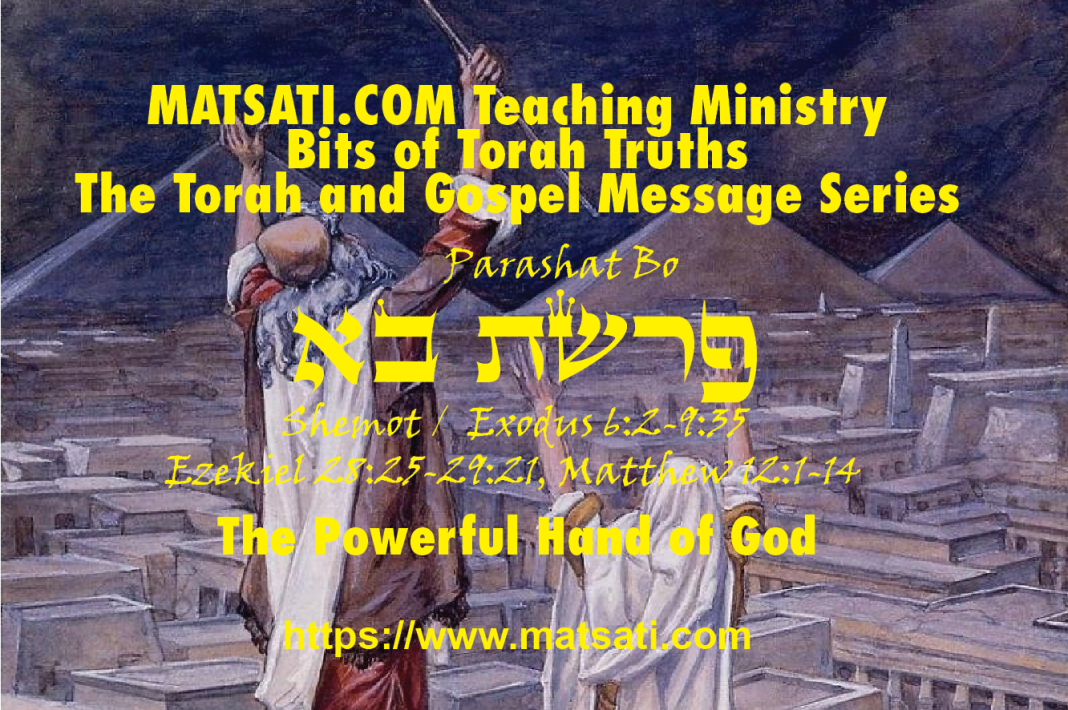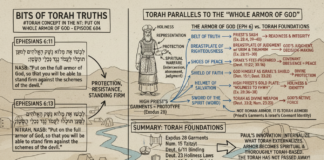In this week’s Torah portion, Parashat Bo, Moshe says to the people in Shemot / Exodus 13:3 “… ‘Remember this day in which you went out from Egypt, from the house of slavery; for by a powerful hand the Lord brought you out from this place. And nothing leavened shall be eaten.” (NASB, ג וַיֹּאמֶר מֹשֶׁה אֶל-הָעָם זָכוֹר אֶת-הַיּוֹם הַזֶּה אֲשֶׁר יְצָאתֶם מִמִּצְרַיִם מִבֵּית עֲבָדִים כִּי בְּחֹזֶק יָד הוֹצִיא יְהוָֹה אֶתְכֶם מִזֶּה וְלֹא יֵאָכֵל חָמֵץ:) Moshe explains how important the deliverance of the Lord is being set free from slavery by God’s powerful hand. He couples this to not eating anything with leaven. The deliverance of Israel was so important, the Lord God designated this as the beginning of months (the biblical new year) and designed an entire week of celebration around the festival of Passover. The idea of the deliverance of God and avoiding leaven has deep spiritual meaning. Leaven is the baking ingredient for bread that causes holes to form in the freshly cooked dough. This occurs by the process of leavening agents releasing gases (CO2) that leads to the raising of the dough. In Hebrew, leaven is called se’or (שְׂאוֹר) whereas a leavened product is called chametz (חָמֵץ). In antiquity, the se’or was a lump of dough that was used to transmit leaven to a fresh batch of dough. The differences between chametz and se’or is that chametz is edible. One eats chametz whereas one does not eat se’or because its function is purely for leavening raw dough. During the Passover, we also have the Festival of Unleavened Bread, where no chametz is to be eaten for a full seven days (15th of Nisan to 22nd of Nisan, see Shemot / Exodus 12:15-18, and 34:18). The reason for the removal of leaven is stated in the Torah according to Shemot / Exodus 12:14-15.
Shemot / Exodus 12:14-15
12:14 And this day will be a memorial for you, and you are to celebrate it as a feast to the LORD, as a lasting ordinance for the generations to come. 12:15 For seven days you must eat unleavened bread. On the first day you are to remove the yeast from your houses. Whoever eats anything leavened from the first day through the seventh must be cut off from Israel. (BRB)
Chametz is interpreted as a corrupting influence, a hidden uncleanness, and the source of other impurities within one’s self. This principle of leaven (chametz) is explained by Paul in 1 Corinthians 5:6-8 when he said, “Your glorying is not good. Do you not know that a little leaven leavens the whole lump? Therefore purge out the old leaven, that you may be a new lump, since you truly are unleavened. For indeed Christ, our Passover, was sacrificed for us. Therefore let us keep the feast, not with old leaven, nor with the leaven of malice and wickedness, but with the unleavened bread of sincerity and truth.” Paul speaks of leaven, the Passover, and the deliverance of God to righteousness. Here Paul connects the evil impulse within us (yetzer hara, יֵצֶר הַרָע) with leaven that corrupts. The idea is that we are made unleavened in the Messiah by faith. The significance of removing leaven is emphasized by the prohibition of chametz not being limited to the festival of Passover and Unleavened Bread, but also all of the minchah (meal) offerings as well bans the presence of chametz from the altar of God in the Mishkhan (Tabernacle).
Vayikra / Leviticus 2:11
‘No grain offering, which you bring to the LORD, shall be made with leaven (chametz, חָמֵץ), for you shall not offer up in smoke any leaven (se’or, שְֹאֹר) or any honey as an offering by fire to the LORD. (NASB, יא כָּל-הַמִּנְחָה אֲשֶׁר תַּקְרִיבוּ לַיהֹוָה לֹא תֵעָשֶֹה חָמֵץ כִּי כָל-שְֹאֹר וְכָל-דְּבַשׁ לֹא-תַקְטִירוּ מִמֶּנּוּ אִשֶּׁה לַיהוָֹה:)
This is why Paul wrote what he did saying, “Cleanse out the old leaven (חָמֵץ) that you may be a new lump, as you really are unleavened. For Messiah our Passover has been sacrificed (מָשִׁיחַ זֶבַח פִּסְחֵנוּ). Let us therefore celebrate the festival, not with the old leaven, the leaven of malice and evil, but with the unleavened bread of sincerity and truth.” (1 Corinthians 5:7-8) Paul wrote in 1 Corinthians 5:6 saying, “Your glorying is not good. Know ye not that a little leaven leavens the whole lump?” Sin has the effect of leavening that influences one’s entire being, body and soul. We simply cannot incorporate a “little bit” of sin in our lives without effecting our entire lives and our relationship with God. This hidden sin will eventually be exposed, Yeshua said “Nothing is hidden that will not be made manifest, nor is anything secret that will not be known and come to light.” (Luke 8:17) Notice how Paul wrote to cleanse out the old leaven so that we may become a new lump because we are unleavened in the Messiah. He is directing us to our current, present identity in the Messiah, as opposed to the former identity in sin and the world. He says we are no longer known according to the flesh, but according to the spirit, because the old person has passed away and we are not a new creation in the Messiah. (2 Corinthians 5:16-17) Paul is directing us to understand that we are who we are because of who we are in the Messiah. He says this to us because in the Messiah we are able to obey because of who we are made to be. It is because of our being in the Messiah, through our union with Him, we are able to please God our Father in heaven. The good news is that it is the Lord God Almighty who is in us who causes us to bear fruit for His kingdom. The chametz that Moshe speaks about during the Passover festival is analogous to sin, and its removal is very important. This parallels our calling to search our lives for inner impurity, to search ourselves and our motivations, so that we may draw near to the Lord with a pure heart. This is the new lump Paul speaks about, a new unmodified lump of dough that may be used in the service to God (i.e. in the tabernacle and sacrifice, etc). We are made unleavened by the presence of God in our lives (through the Holy Spirit) and so Paul says we are to put away the old nature (2 Corinthians 5:17) and remove from our lives the influences that lead to sin.
The problem with leaven is that it is symbolic of death and decay. The process of allowing dough to rise is symbolic of gases being produced due to decay. Jewish sources write that the leaven is analogous to the yetzer hara, the evil impulse within us. (Yismach Yisrael on Pesach Haggadah, Magid, Ha Lachma Anya 3:7) The connection to Yeshua is to His purity, innocence, sinlessness, and holiness. His life and sacrifice upon the cross was unleavened, it did not have the stain of the curse of death. This was how He was considered “a lamb without spot or blemish” (1 Peter 1:19). After he was placed in the tomb, his body did not suffer the corruption of decay (decomposition). His body did not return to dust, this led to Yeshua overcoming death and making atonement by His sacrifice for us. (Hebrews 9:26) We are sanctified by our faith in the afflictions that Yeshua took on our behalf. Sanctification is a work of God in our lives through His Holy spirit (1 Corinthians 6:11). We do not merit righteousness through good deeds (see Titus 3:5-6) but by humbling ourselves before God and trusting in Yeshua for righteousness (see John 6:28-29). This concept of removing the leaven (chametz) symbolizes our identification with the Lord, in humility, in afflictions, and in the presence of God dwelling in our midst, all of which are Torah centric principles. We are sanctified by the mercy of God; this is then demonstrated in our lives by the fruit of the spirit. This is different from the outward show of religion because it is related to the covenant we have with God in the Messiah, and of who we are in the Messiah. This is paralleled to our former life as slaves to sin (i.e. Egypt) and being set free as the children of God (at Sinai). These concepts are all paralleled to the Lord God Almighty who delivered ancient Israel from Egypt, it was the work of God who did this. We recognize God working in our lives for His purposes to bring glory to His name. The unleavened bread (the bread of affliction testifies to our faith in His righteousness, and the confession of our own weakness to live righteous lives (to remain obedient to the commands). The Passover commemorates that salvation is of the Lord and not of our own making. The remembering that Moshe commands Israel to observe (Shemot / Exodus 13:3) is symbolic of all of these things. These things call out to us from the pages of Scripture, to live with humbleness of heart, to be innocent of heart, to seek truth, justice, and mercy, and to love one another, to not take on the way of the world, but to seek the well being of the widow, the orphan, and the oppressed, and to do these things by abiding in the love and mercy of God. This is how the Torah and the Gospel Message work together!









